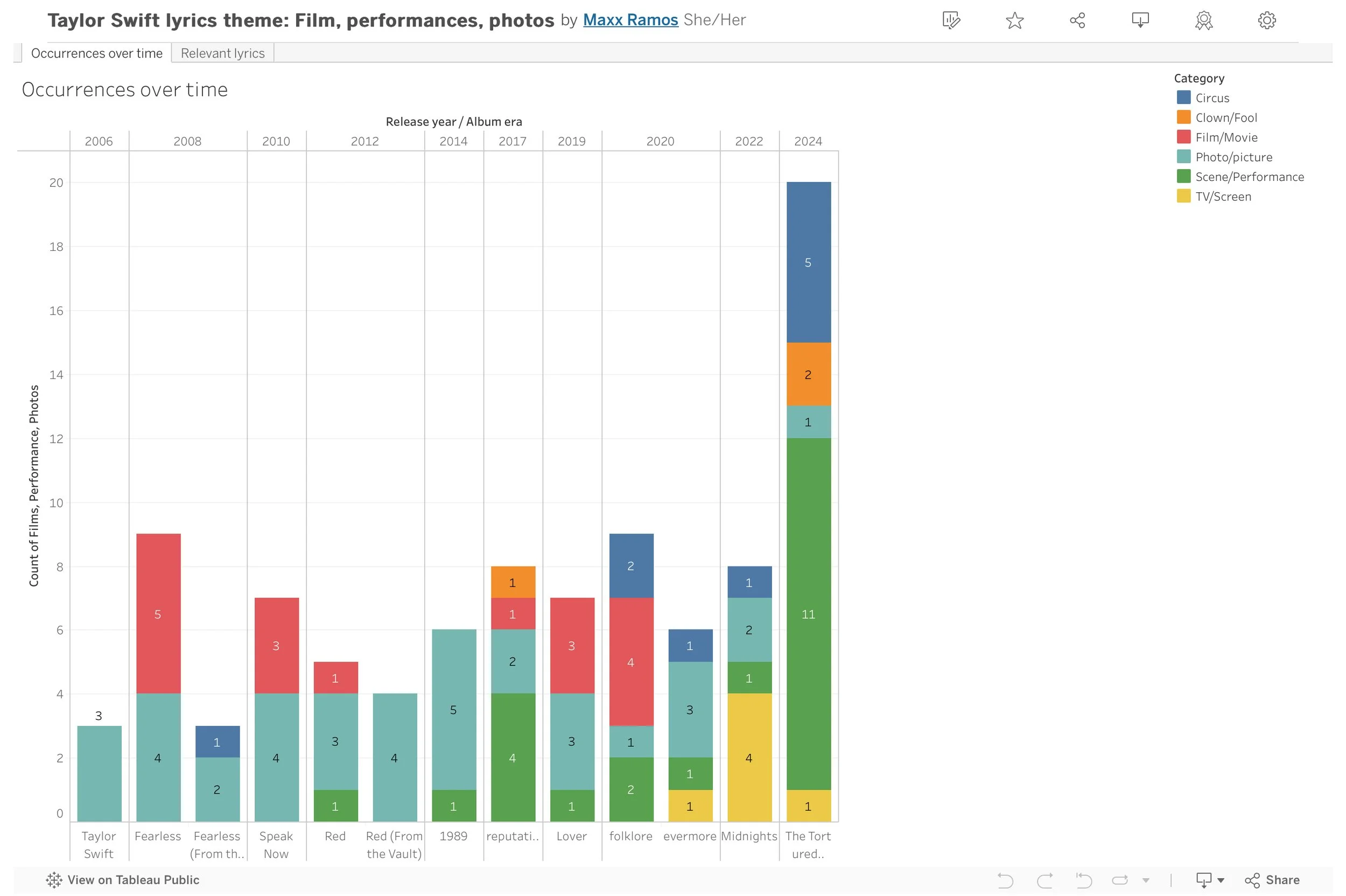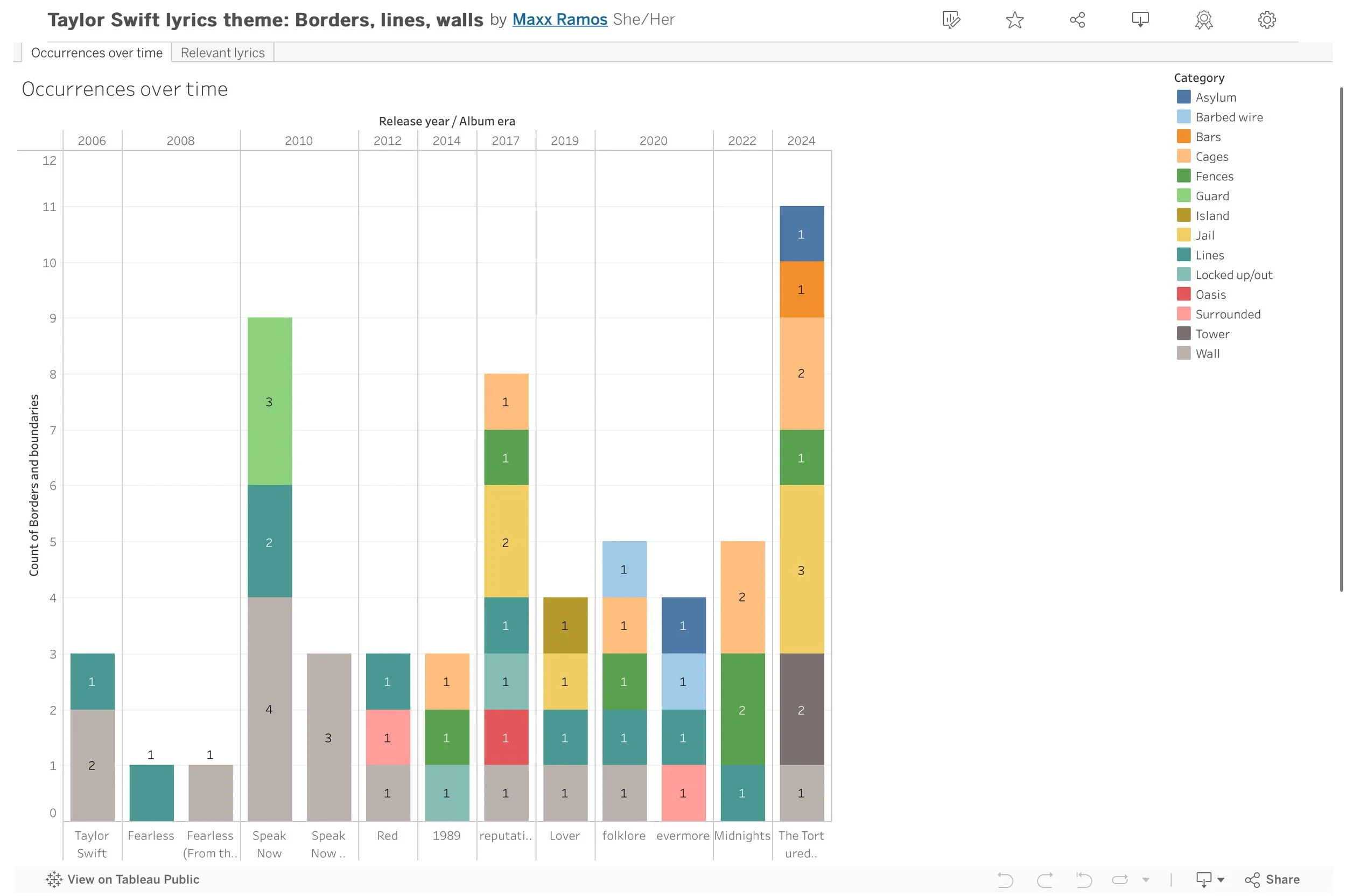Motifs in The Tortured Poets Department by Taylor Swift (with data)
I'm back for my data analysis of motifs used in Taylor Swift's discography and the themes they explore, this time with The Tortured Poets Department.
I started this project because I'm interested in how Taylor revisits her memories. As I’ve aged, my relationship to my memories has changed and I see this reflected in Taylor's writing too. The motifs she developed span her entire discography, not just one album, which differentiates her as a singer-songwriter. When we listen to her music, we hear the symbols and metaphors she chose to represent the story of her life. Sometimes, it means revisiting the parts of ourselves that we’ve actively avoided.
My methodology and previous work
Sources I compiled and referenced for this data analysis
Lyrics trends in Taylor Swift's discography on Google Sheets
Graphs of lyric trends over Taylor Swift's discography on Tableau
Note: I'd like to emphasize we don't know Taylor and I'm not interested in dissecting/paternity testing who her songs are about. Her relationships and her feelings about them can intersect and are more complex than the 2-10 minute songs written about them. :)
With that said, let's get started on this analysis of my favorite motifs, some lyrical connections to her previous work, and how they speak to the larger themes in The Tortured Poets Department.
Death, graves, and ghosts (Regrets and changing your mind)
Death, ghosts, and haunting chart as of 17 May 2024, Source on Tableau
Is anyone surprised that death takes the stage on The Tortured Poets Department? She sings of killing her husband, killing her former lover's wife, of people wanting her to die, and of dying on the inside. Taylor has sung about catastrophizing her life and her relationships so many times, that perhaps death is the easiest fix to this madness. Her reputation era is where all her fears finally became true. Specific mentions of her death start in reputation, slowly increase on the way to Midnights, and explode in The Tortured Poets Department. Whether by murder, by haunting, or by mocking, she's finding ways to make the people who wronged her miserable too. Death seems like the best solution, but even death has its downsides.
peace: I would die for you in secret
The Smallest Man Who Ever Lived: I would have died for your sins, instead I just died inside
Taylor also takes us to the graveyards in her mind. Graves have often referred to memories that should be dead and gone and buried…and as of this album, have not stayed that way. Taylor opens the crypt, changing her mind on the relationships and conflicts of her past, all while also mourning the decisions that lead to the death of a long-term relationship. What died didn't stay dead, and she’s looking for answers in the roads not taken.
the 1: for digging up the grave another time
loml: should have let this stay buried
When you dig up graves, you also awaken new ghosts. Ghosts and hauntings are not new to her discography (Haunted, Speak Now), but these ghosts have gained strength in numbers. Mentions of hauntings and ghosts have increased from the Lover era, a side effect of growing up, losing lovers, and living with visceral regret. This album is an exploration of how to reconcile your life with your living ghosts and failing at that too.
champagne problems: I dropped your hand while dancing, crest-fallen on the landing
loml: Dancing phantoms on the terrace, are they second-hand embarrassed
The Archer: I wake in the night, I pace like a ghost
Anti-Hero: When my depression works the graveyard shift, all of the people I've ghosted stand there in the room
Florida!!!: Barricaded in the bathroom with a bottle of wine… Well me and my ghosts had a hell of a time
The graveyard is the stage for her second act. She once called out her detractors in Mean and mocked their ideas of her in Blank Space. If her relationships and career can fail when she’s being “good girl”, what’s the worst that can happen when she decides to be bad? She starts the next act of her career digging up hatchets and dead bodies. She’s in command, and all we can do is watch.
Films, photos, and evidence (The decay of memories)
These ghosts come from somewhere, sometimes immortalized in what I like to call the internet graveyard. Videos and pictures crystalize experiences that would otherwise be lost to time. Photos have been a personal favorite of Taylor's to capture memories, both literally and figuratively. Mentions of them disappear in The Tortured Poets Department. Perhaps these memories have transformed into ghosts without a tangible body anchoring them to this earth. Maybe she’s reframed it and has stilled our ability to witness her life. It’s an act of defiance against an industry and audience that demands more.
While she's referred to movies as stand-in for wishful thinking, they're previously referred to in the literal sense, as activities or topics of conversation. In folklore and beyond, movies and TV are used as ways to relive recent memories or imagine different outcomes and lives, separate and distinct from the one she’s living.
Film, performances, photos chart as of 17 May 2024, Source on Tableau
If This Was a Movie: It's not the kind of ending you wanna see now, baby what about the ending?
The Archer: Cause cruelty wins in the movies, I’ve got 100 thrown out speeches I almost said to you
exile: I think I've seen this film before, and I didn't like the ending
this is me trying: You're a flashback in a film reel on the one screen in my town
The Tortured Poets Department: But I've seen this episode and still loved the show
The bonus tracks in Midnights reframe the preservation of memory as evidence. She calls the reader to burn the evidence but cries over a hat. The same files that could be used in a post-mortem, as review of what’s dead and proof that her experience was real. All those photos and films are merely pieces in the case file of her life, which become a recollection she calls The Manuscript by the end of her latest album. I love the idea that she reclaims her past and it's reborn, from the ashes, in the songs she shares with us.
Dear Reader: Burn all the files, desert all your past lives, and if you don't recognize yourself, that means you did it right
Hits Different: I find the artifacts, cried over a hat, cursed the space that I needed
Hits Different: I trace the evidence, make it make some sense, why the wound is still bleedin'
How Did It End?: We hereby conduct this post-mortem
The Manuscript: The only thing that's left is the manuscript, one last souvenir from my trip to your shores
How we store our memories affects how easily we can access them. When they're fresher, it's easier to relive every feeling and revisit each scene within them. As time goes on, these memories decay until all that's left is the photo or file or memento that prove it was real once. In Dear Reader, she was ready to burn all her past lives… But she instead, lovingly memorializes her old selves and memories as The Manuscript.
Scenes and circuses (Celebrity and publicity)
Movies, TV shows, and screens are an extension of another theme in The Tortured Poets Department: fame. This album is the first time she comments directly on her relationship with it, her fans, and its detrimental effects in her life. Since Red, she's referred to Hollywood as a scene, full of people performing and the invasive nature of the entertainment industry.
Would’ve, Could’ve, Should’ve: If I never blushed, they could have never whispered about this
But Daddy I Love Him: Sarahs and Hannahs in their Sunday best, clutching their pearls, sighing "What a mess"
I Can Fix Him (No Really I Can): They shake their heads sayin', "God, help her" when I tell 'em he's my man
Clowns and circuses are also metaphors for fame. First introduced in reputation, they capture the absurdity of the entertainment industry and the stories it tells about her. Despite this, she wants to win their attention and at their game, even at the cost to herself. Taylor has said she’s willing to “greatly inconvenience [herself] to prove a point.” In this latest album, she revisits the circus and drags it into her mania.
mirrorball (truncated): And they called off the circus… when they sent home the horses…I'm still trying everything to get you laughing at me
Karma (truncated): …karma is a cat…Flexing like a goddamn acrobat
Who’s Afraid of Little Old Me?: I was tame, I was gentle 'til the circus life made me mean
While clowns refer to the outrageous performers in entertainment, she refers to herself as a fool in the play of love. Clowns and fools are all performers in the spectacle that is Hollywood, and sometimes it’s impossible to differentiate between the two.
peace: robbers to the east, clowns to the west, I'll give you my sunshine, I'll give you my best
The Alchemy: Ditch the clowns, get the crown, baby I'm the one to beat
Chloe or Sam or Sophia or Marcus: I changed into goddesses, villains and fools
The Prophecy: Cards on the table, mine play out like fools in a fable, oh
The Tortured Poets Department is the first time that we, as her audience, are featured in her songs. We are Sarah, and Hannah, and Daddy. We are the interlopers and the empaths in vipers’ clothing. We are the loyal subjects looking to crown the next pop queen in fandom wars. We are the aliens that swept her up with universal adoration, demanded encounters close and closer, only to leave her down bad when she disappointed us. We are the soldiers eagerly feeding the machines that the entertainment industry manipulates to keep our attention and she knows it. Tumblr and TikTok and Instagram and Twitter are the tools for her to inject her narcotics, but also see the expectations we make upon her.
We are the fans and we demanded more. When we finally got these roles, we didn’t like the parts we played. She’s a mirrorball reflecting every version of ourselves right back at us.
Cages, fences, jails, towers, and asylums (Expectations and her mental health)
Borders, lines, and walls chart as of 17 May 2024, Source on Tableau
Throughout her discography, Taylor has sung about the boundaries she set, expectations she had, and how those lines were crossed. 1989 is when we first see mentions of cages and fences, as she's trapped in the limelight and desperately searching for an escape. It also coincides with the height of her pop career as she switched genres, made a critically acclaimed pop album, and experienced more public scrutiny on her appearance, her abilities, and her dating life.
I Know Places: Lights flash and we run for the fences
Midnight Rain: My town was a wasteland, full of cages, full of fences
But Daddy I Love Him: I'm telling him to floor it through the fences
In reputation, she refers to her lover as her jailer. In this album, she realizes that the prison she once loved is a cage in a different form. This cage has different expectations that the one that fame has placed on her. She tends to her partner's mental health and needs, which she prioritizes above her own. These constraints press into her own desire for love as the person she is, not the brand that is perceived. Taylor has long tolerated these demands because they're the ones she chose, somehow more bearable than the ones forced on her by us and the industry.
On jail
Ready for It?: He can be my jailer, Burton to my Taylor
Fresh Out the Slammer: Fresh out the slammer, I know who my first call will be to
On the mental health of her partner
Red: I pull at every thread, tryna solve the puzzles in his head, live my life scared to death he'll decide to leave instead
Red: If I was standing there in your apartment, I'd take that bomb in your head and disarm it.
The Tortured Poets Department: Who else decodes you?
So Long, London: I stopped tryna make him laugh, stopped trying to drill the safe
Guilty As Sin?: Crashing into him, he's a paradox
How can one juggle the expectations of a public life and a private relationship? She’s expected to commodify emotional intimacy at the cost of her private life. She’s expected to protect her relationship by retreating from a public one. Her desires are in conflict with these expectations, constricting her ability to breathe. But Taylor isn’t going down without a fight, and it’s time to cut at what’s tying her down.
Freedom
Taylor longs for an escape from her grief, from the industry, and from the fate that she's consigned herself to. The deification of her public persona resulted to an incredibly isolated life, a side effect of her brand’s authenticity. Is it even possible for her to have love and success in the Hollywood circus, the madhouse? Can anyone come out human in a place where the players and spectators are committed to eating each other alive?
champagne problems: This dorm was once a madhouse, I made a joke, "It was made for me."
Who's Afraid of Little Old Me?: You wouldn't last an hour in the asylum where they made me.
Escape in all these scenarios means rattling the cages that were placed around her. She dates objectionable men (much to our dismay) and throws tantrums when she can't have her way. If it weren't for these cages, and perhaps her pathological people pleasing, perhaps she could have been more grown and mature. Maybe she’ll finally appease the ravenous crowds and war machines. But these tantrums only place her higher on the impossible pedestal of the public eye.
But Daddy I Love Him: Dutiful daughter, all my plans were laid
Chloe or Sam or Sophia or Marcus: I crashed into you like so many wrecks do, too impaired by my youth to know what to do
Down Bad: Now I'm down bad crying at the gym, everything comes out teenage petulance
The Prophecy: And I sound like an infant, feeling like the last drops of an ink pen
She can't climb down from the pedestal or meet love’s unreachable expectations. While she resents both, she can't help but wonder if there's some truth in it. In this album, she's looking for ways to escape the cycle in the relationships she's created, whether it’s with us or her lovers.
Blank Space: But darling I'm a nightmare dressed as a daydream.
Cassandra: I was in my tower, weaving nightmares.
The Albatross: Locked me up in towers, but I'd visit in your dreams.
High infidelity: At the house lonely, good money, I'd pay if you just know me
The Prophecy: Don't want money, just someone who wants my company
Getaway Car: We were driving in a getaway car, we were flying but we never get far
The Bolter (truncated): It always ends up with a town car speeding…but as she was leaving, it felt like breathing
Taylor’s freedom is in reclaiming her stories, no matter how messy they are or bitter they sound. She punches back against every snide remark and joke made at her expense and spills everything she wishes she did when it was relevant to her life. If she's going to live with ghosts, she might as well speak her piece. She revisits the effervescent joy of a high school crush in So High School, delivers snark in thanK you Aimee, and prays that innocence can last a little longer in Robin. These moments are fleeting, and she won't be seven or Fifteen or 22 forever. These songs are just one part of her manuscript, the memories that may escape as time erodes her mind.
Summary
I could go on forever (and I have), but the album is Taylor's most direct commentary on fame's effects on her life, her relationships, and her own health. It has an outsized influence on how she's chosen to live, date and present herself, and she's had enough. Could someone love her through all she’s been through? Or, will she be left with the evidence and ghostly regrets of relationships long gone? That’s a fate she’s willing to fight. Personally I wish she punched back sooner, but sometimes it takes a while to wind up. Better late than never.
Despite the album's bleak outlook, Taylor has always been an optimist. She takes us on a rollercoaster of emotions, letting us into her life, criticizing our behavior towards her, and has hopefully drawn a firm boundary on what she’s no longer willing to tolerate. She’s embraced her ghosts and wants us to know those stories are ours.
There's so much more I can say but I'll end it here!
Bonus: Other insights I enjoyed
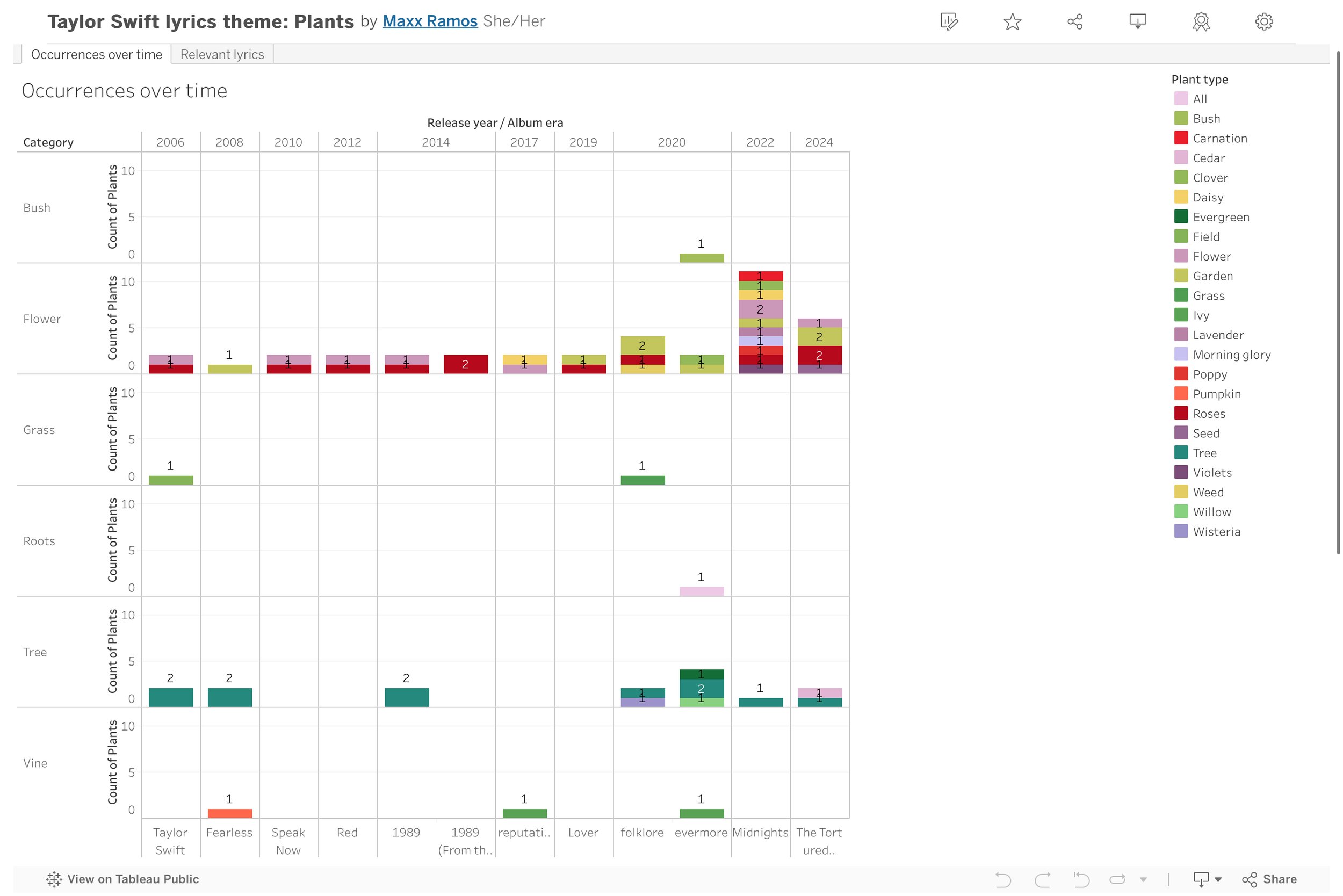
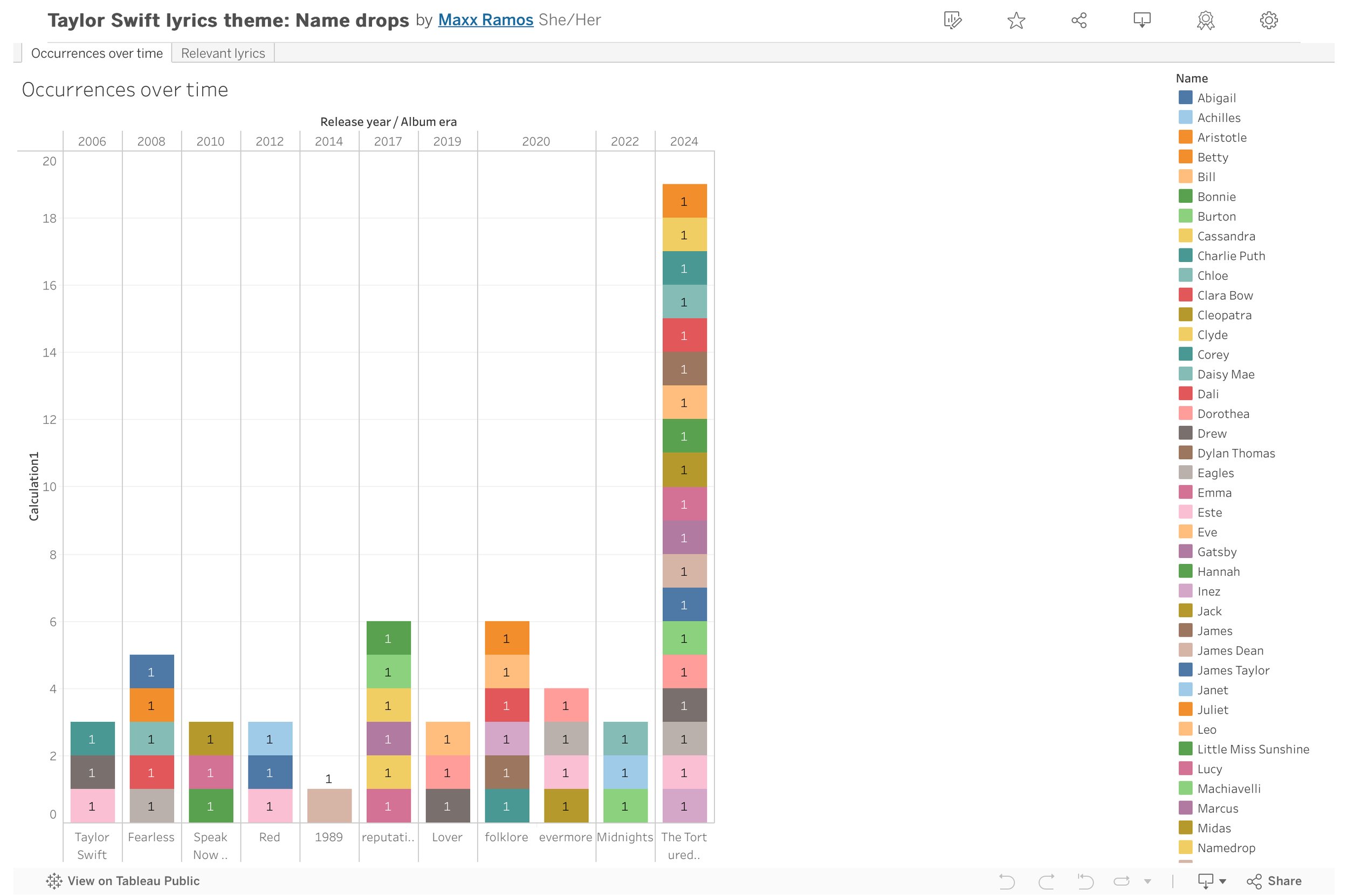
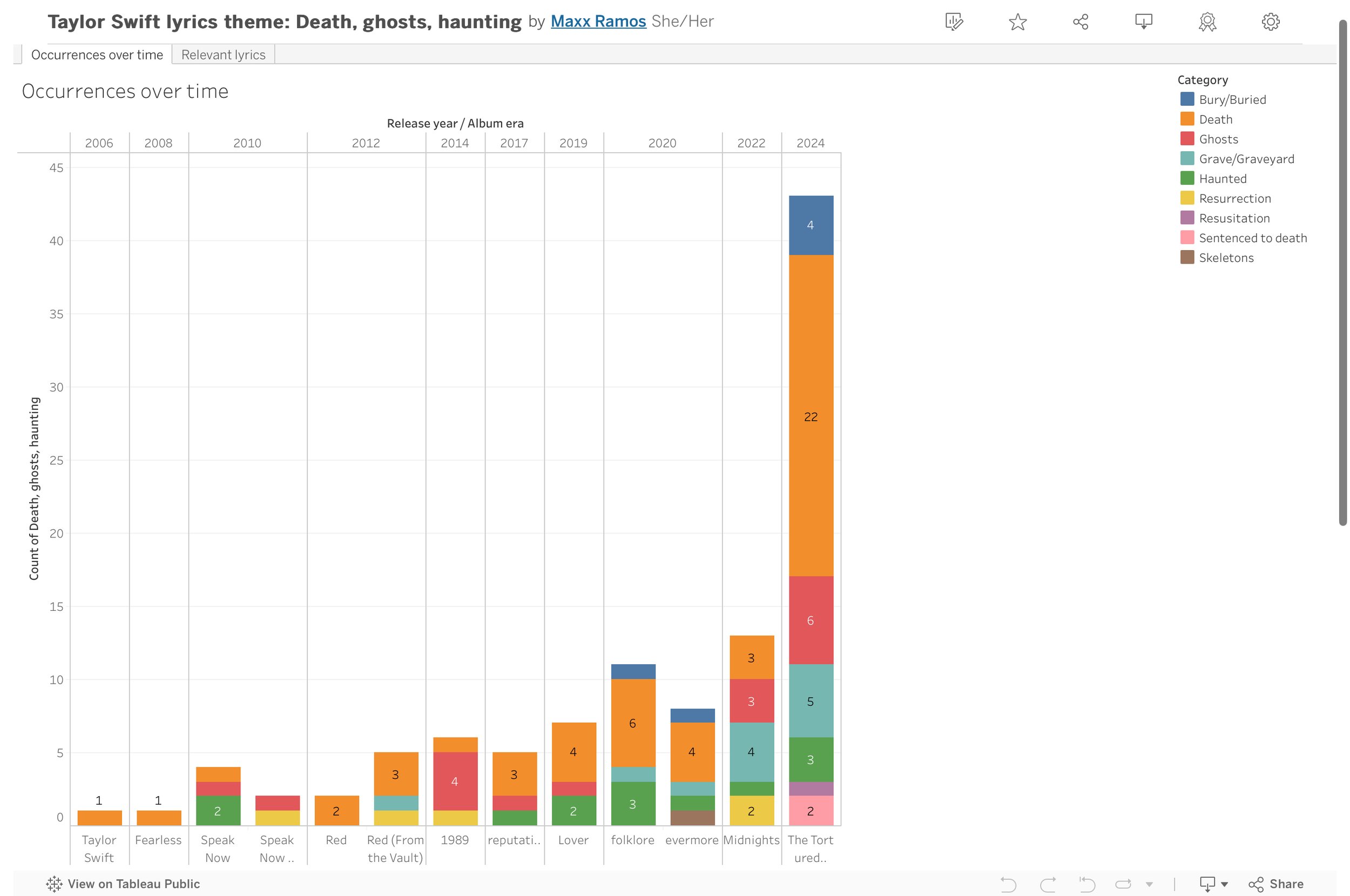

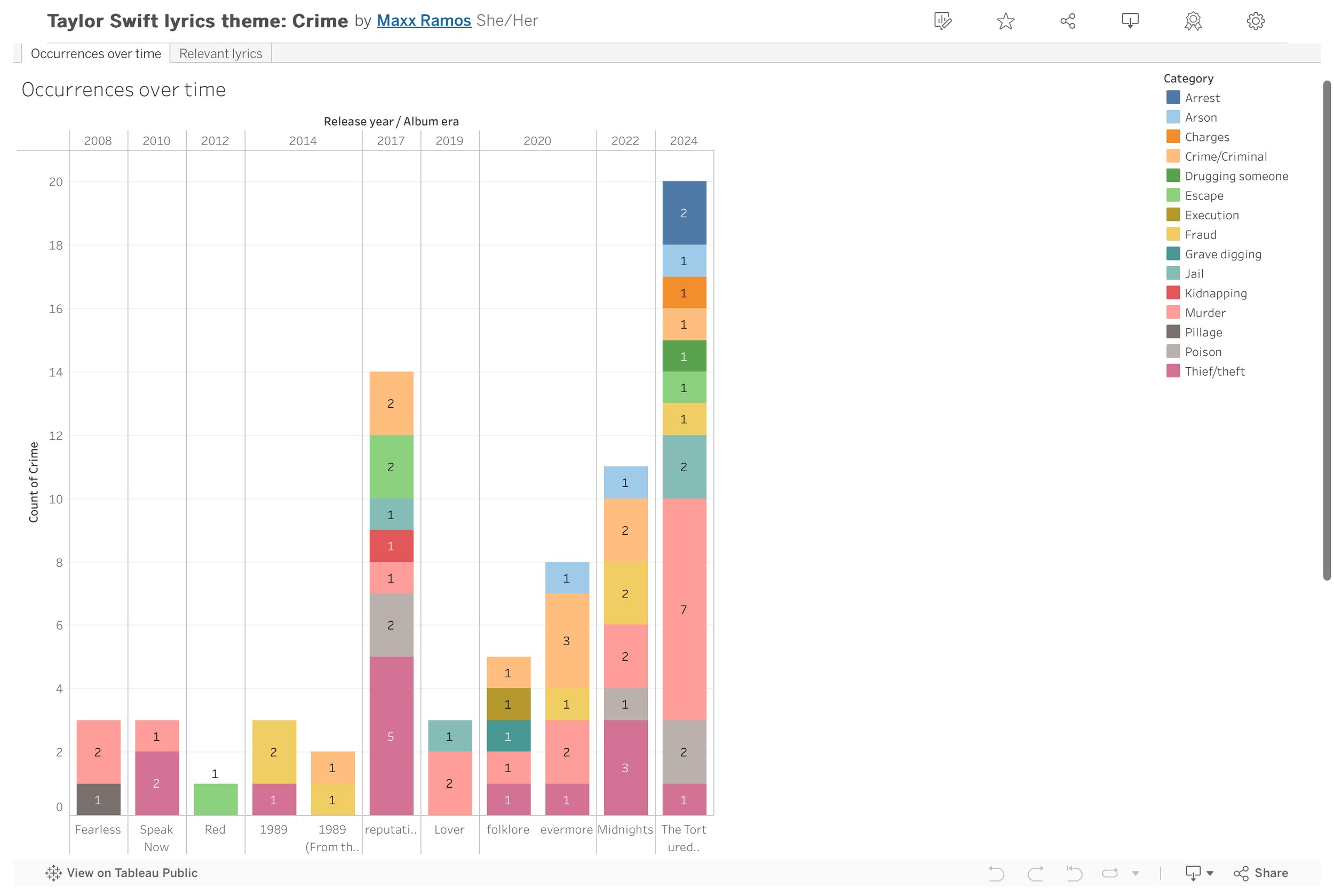
Mentions of flowers start in folklore and peak in Midnights… Only to completely drop off in The Tortured Poets Department save for a singular mention of roses and this: He was a hothouse flower to my outdoorsman
Speaking of outdoorsman, Taylor is once again calling herself the archer, the hunter. Eager to chase her dreams, goals, and take aim at whatever threatens her.
Taylor has dropped more names in this album than any other singular album. This doesn't even count references to other works… It's literally just names. I love this because it speaks to the fact that the secret gardens in her mind are richer than we can ever imagine and know.
Taylor mentions dreaming and fantasizing more on this album than others, the only kind of escapism she can engage in when trapped in the cage that is fame.
More crime on this album than others. Mostly murder.
This was long, so let me know if you enjoyed it! Happy to go over specific songs, symbols, and other themes (with data) or look at ways her motifs have developed over time!
Related links

